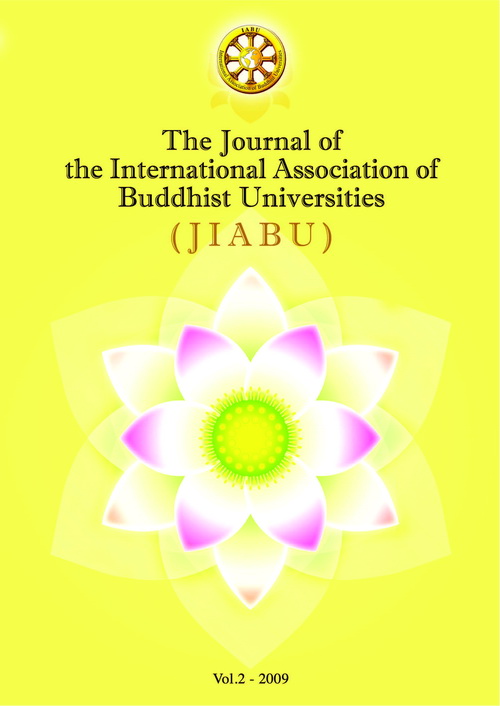Anger Management: A Buddhist Perspective
Main Article Content
Abstract
How could we forget those ancient myths that stand at
the beginning of all races-- the myths about the dragons that
are at the last moment transformed into a princess. Perhaps
all the dragons in our lives are only princesses waiting for us
to act, just once, with beauty and courage. Perhaps everything
that frightens us is, in its deepest essence, something helpless
that wants our love.
Article Details
How to Cite
de Silva, P. (2009). Anger Management: A Buddhist Perspective. The Journal of International Association of Buddhist Universities (JIABU), 2(1), 121–134. retrieved from https://so06.tci-thaijo.org/index.php/Jiabu/article/view/204993
Issue
Section
Article
Views and opinions expressed in the articles published by The Journal of the International Association of Buddhist Universities (JIABU), are of responsibility by such authors but not the editors and do not necessarily reflect those of the editors.
References
De Botton, Alain, 2004, Status Anxiety, Penguin Books, London.
de Silva, Padmasiri, 2005, An Introduction to Buddhist Psychology,
4th edition, 2005, Palgrave-Macmillan, Hampshire (UK) &
New York.
De Silva, Padmasiri, 2008, An Introduction to Mindfulness-Based
Counselling, Sarvodaya-Vishvalekha, Ratmalana.
Ekman, Paul, 2003, Emotions Revealed, Weidenfeld and Nicolson,
London.
Goldstein, Joseph, 1994, Insight Meditation: The Practice of
Freedom, Boston, London, Shambala.
Goleman, Daniel, 1996, Emotional Intelligence: Why It Can Matter
More Than IQ, Bloomsbury, London.
Harris, Russel, 2006, “Embracing your demons: An Overview of
Acceptance and Commitment Therapy”, Psychotherapy in
Australia, Vol.3, No 3, August.
James, William, Principles of Psychology, 1918, Dover Publications,
New York.
Ledoux, Joseph, 1996, The Emotional Brain, Simon and Schuster,
New York.
Nyanaponika Thera, 1975, The Heart of Buddhist Meditation, Rider
and Company, London.
Nyanaponika Thera, 1986, The Power of Mindfulness, Buddhist
Publication Society, Kandy.
Rilke, Maria Rainer, 1984, Letters to a Young Poet, trans. Stephens,
Michel, Modern Library New York.
Rumi, ‘The Guest House’, Quoted in, Kabat-Zinn, 2005, Coming
To our Senses, p.263, PIatkus, New York.
de Silva, Padmasiri, 2005, An Introduction to Buddhist Psychology,
4th edition, 2005, Palgrave-Macmillan, Hampshire (UK) &
New York.
De Silva, Padmasiri, 2008, An Introduction to Mindfulness-Based
Counselling, Sarvodaya-Vishvalekha, Ratmalana.
Ekman, Paul, 2003, Emotions Revealed, Weidenfeld and Nicolson,
London.
Goldstein, Joseph, 1994, Insight Meditation: The Practice of
Freedom, Boston, London, Shambala.
Goleman, Daniel, 1996, Emotional Intelligence: Why It Can Matter
More Than IQ, Bloomsbury, London.
Harris, Russel, 2006, “Embracing your demons: An Overview of
Acceptance and Commitment Therapy”, Psychotherapy in
Australia, Vol.3, No 3, August.
James, William, Principles of Psychology, 1918, Dover Publications,
New York.
Ledoux, Joseph, 1996, The Emotional Brain, Simon and Schuster,
New York.
Nyanaponika Thera, 1975, The Heart of Buddhist Meditation, Rider
and Company, London.
Nyanaponika Thera, 1986, The Power of Mindfulness, Buddhist
Publication Society, Kandy.
Rilke, Maria Rainer, 1984, Letters to a Young Poet, trans. Stephens,
Michel, Modern Library New York.
Rumi, ‘The Guest House’, Quoted in, Kabat-Zinn, 2005, Coming
To our Senses, p.263, PIatkus, New York.


